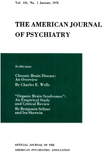The psychiatrist's double bind: the right to refuse medication
Abstract
The assertion of a patient's right to refuse medication places a psychiatrist in a double bind because he or she knows that medication will often greatly relieve mental disturbance. Delaying medication until the patient is formally judged incompetent and a guardian appointed causes discomfort for the patient, the physician, staff, and other patients. On the other hand, forcing medication on a patient undermines the latter's sense of autonomy and may interfere with his or her constitutional rights, as a federal judge has ruled in the famous Boston State Hospital case. The right to refuse medication presents a uniquely intriguing case study of a need for accommodation between abstract constitutional concepts and practical realities and has opened a profound legal and ethical debate about the nature of "true freedom."
Access content
To read the fulltext, please use one of the options below to sign in or purchase access.- Personal login
- Institutional Login
- Sign in via OpenAthens
- Register for access
-
Please login/register if you wish to pair your device and check access availability.
Not a subscriber?
PsychiatryOnline subscription options offer access to the DSM-5 library, books, journals, CME, and patient resources. This all-in-one virtual library provides psychiatrists and mental health professionals with key resources for diagnosis, treatment, research, and professional development.
Need more help? PsychiatryOnline Customer Service may be reached by emailing [email protected] or by calling 800-368-5777 (in the U.S.) or 703-907-7322 (outside the U.S.).



